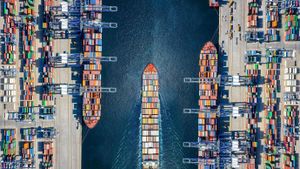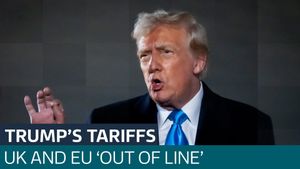U.S. Secretary of State Marco Rubio visited Panama City on the 2nd of the month, engaging President Juan Carlos Varela in discussions centered around the management of the Panama Canal. This meeting has drawn significant attention as it brings to light the Trump administration’s push to reclaim control over the canal, which the U.S. built and operated until 1999.
Following the visit, Rubio reiterated the United States' stance against growing Chinese influence within the strategic waterway. "China’s influence over the Panama Canal needs to be eliminated," he stated, reflecting the urgency felt by the Trump administration to counteract what it perceives as encroachment on American interests.
The discussions were not merely one-sided; President Varela strongly defended Panama’s sovereignty over the canal, stating, "The management of the Panama Canal is under our control." This declaration signifies the Panamanian government’s firm resistance against any perceived U.S. pressure to alter their diplomatic relations with China.
Historically, the Panama Canal has been significant not only for trade but also as a symbol of U.S. influence and engineering prowess. Since its completion, it has served as a strategic asset, shifting shipping and transportation dynamics globally. Control over the canal transitioned to Panama on December 31, 1999, following the Torrijos-Carter Treaties which ended over 80 years of U.S. governance.
Currently, the atmosphere surrounding the canal's governance is tense. The Trump administration’s rhetoric about reclaiming authority ties closely to broader U.S.-China competition. Political analysts suggest this could exacerbate anti-American sentiment within Panama if perceived as imperialistic, especially as Panama continues to bolster trade relations with Beijing.
Rubio's visit was also aimed at addressing regional challenges posed by China’s investments and its belt-and-road initiative. The United States sees Chinese engagement as undermining its influence and as risky for both regional stability and security. The precarious balance of U.S.-China relations is very much hanging over the negotiations around the canal.
After their discussions, both leaders have implied there might need to be countermeasures if China's influence continues to grow unchecked within the region and particularly concerning the canal. Rubio emphasized this, warning of necessary measures should the situation escalate.
The Panama Canal is pivotal not only for Panama’s economy—contributing over 30% of its GDP—but also for global shipping routes. With about 14,000 vessels passing through every year, the stakes are high. If U.S. pressure continues, there is potential for the Dominican Republic and other Central American nations to reevaluate their ties with the United States.
Experts suggest future negotiations will require delicate diplomacy, balancing the interests of both Panama and the U.S. The growing role of China as both an investor and a competitor complicates these discussions.
While Rubio’s visit was meant to bolster alliances and solidify U.S. interests, the strong pushback from Panama signified the complexity of modern geopolitical relationships. The U.S. must tread carefully to avoid alienation, particularly amid increasing global multipolarity where countries like Panama can explore diverse affiliations without fear of excessive reprisal.
The situation remains fluid, and both countries will have to navigate this delicate terrain with care as the geopolitical dynamics evolve. The outcome of this dialogue will be pivotal not only for the Panama Canal but also for the future of U.S.-Latin America relations.



